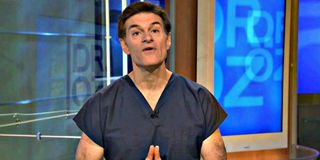Most Of Dr. Oz's Medical Advice Is Wrong, According To Science

America’s doctor, Dr. Oz, speaks in a way his viewers can understand. By avoiding the medical speak that often leaves people confused, Dr. Oz has become one of the most popular talk-show hosts on television. So far, even with all his popularity, only a handful of his medical claims have been questioned. That was until science stepped in, and took a hard look at what exactly Dr. Mehmet Oz has been saying on his show. And science found, most of it is absolutely incorrect.
The Dr. Oz Show brings in about 2.9 million viewers each day. The majority of those viewers trust every single word coming out of the host’s mouth. But many doctors have expressed alarm at some of Oz’s choices, particularly because he often focuses on ‘entertaining’ subjects such as cancer and weight loss.
With many doctors and scientists concern about level of trust his viewers put in him, a study was conducted. That study, published in the British Medical Journal, randomly selected 40 episodes of the The Dr. Oz Show and evaluated all of the recommendations on the program. The results found that within the random selection of episodes, only 46% of his claims actually had evidence to support them, 15% were contradictions, and 39% could not be found.
There were some limitations to the study, for instance researchers found some of the recommendations to be very general and difficult to find in medical research, and also said it was sometimes difficult to figure out “what was said and what was implied”. But the general conclusion is that viewers need to be careful of what they are taking as fact from medical talk show hosts such as Dr. Oz. The study read:
”Consumers should be skeptical about any recommendations provided on television medical talk shows, as details are limited and only a third to one half of recommendations are based on believable or somewhat believable evidence… Decisions around healthcare issues are often challenging and require much more than non-specific recommendations based on little or no evidence from media health professionals.”
Viewers should be skeptical, because even though he has a medical degree that doesn’t mean that he is immune to the inner workings of the talk show business. And likable hosts, from Ellen to Oprah can give viewers terrific advice that is often used in their own lives, but at the end of the day, it is still somewhat a money making tactic. That’s what most of these shows are. And the more popular it is, usually coincides with the more entertaining it is. Should serious medical advice that affects your well-being be entertaining? That’s the question we all need to ask ourselves when mindlessly following claims for things such as magic weight-loss coffee beans.
CINEMABLEND NEWSLETTER
Your Daily Blend of Entertainment News
Most Popular



